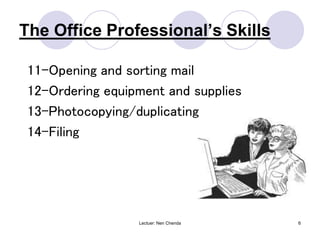01. Introduct to Office Management.ppt
- 1. Chapter 1 Introduction to Office Management 1 Lectuer: Nen Chenda
- 2. What does an Office Manager do? ?An office manager is an employee charged with the general administrative responsibilities of any given office of a corporation. ?In small and medium sized companies the task is often given to the corporation's bookkeeper. 2 Lectuer: Nen Chenda
- 3. What does an Office Manager do? ?In large companies there will often be several offices in several geographical areas, and each one will have an office manager. 3 Lectuer: Nen Chenda
- 4. The Office Professional°Øs Skills 1- Managing projects 2- Operating word processing equipment 3- Supervising people 4- Keeping financial records 5- Composing letters for executives 4 Lectuer: Nen Chenda
- 5. The Office Professional°Øs Skills 6- Making travel arrangements 7- Arranging and scheduling appointments and meetings 8- Typing 9- Taking shorthand/dictation 10- Answering and routing calls 5 Lectuer: Nen Chenda
- 6. The Office Professional°Øs Skills 11-Opening and sorting mail 12-Ordering equipment and supplies 13-Photocopying/duplicating 14-Filing 6 Lectuer: Nen Chenda
- 7. The Office Professional Knowledge 1. Typing/keyboarding 2. English language usage/spelling 3. Computer operation 4. Cooperation with co-workers 7 Lectuer: Nen Chenda
- 8. The Office Professional Knowledge 4. Office machines (copiers, fax, answering) 5. Customer/client service 6. Mathematics/some accounting 8 Lectuer: Nen Chenda
- 9. Tips for providing good service to clients ? Get to know who your customers are and what they need ? Make it easy for customers to come to you with their problems and concerns ? Make your customer concerns your concerns (even if the details don°Øt come under your job description). ? Make customer satisfactions one of your top goals 9 Lectuer: Nen Chenda
- 10. Communication skills ?Think before speaking. Not only to organize what you say but to select the right words. ?Use proper grammar. If you°Øre not sure, consult a dictionary or well-informed co- worker ?Avoid profanity ®C it is offensive to many people (even if they don°Øt tell you) 10 Lectuer: Nen Chenda
- 11. Communication skills ?Use humor when it can relieve tension or improve morale, but keep it appropriate. Never use humor to hurt another person ?Remember that keeping silent is better than saying something inappropriate or in poor taste 11 Lectuer: Nen Chenda
- 12. The Seven Cs of Communication ? Completeness ? Conciseness ? Consideration ? Concreteness ? Clarity ? Courtesy ? Correctness 12 Lectuer: Nen Chenda
- 13. Receptionist°Øs Duties ?Customer Service ?Salesperson ?Cashier ?Financial Recorder ?Secretary 13 Lectuer: Nen Chenda
- 14. Elements of a positive attitude ?An Upbeat Manner ?Consistency ?Empathy ?Self-Confidence ?Goal Setting 14 Lectuer: Nen Chenda
- 15. How to become a professional ? Study people with established records for excellence. ? Become a positive self-analyst. ? Accept suggestions for improvement. 15 Lectuer: Nen Chenda
- 16. How to become a professional ?Identify how formal education can contribute to your growth. ?Recognize that setbacks will occur, but balance them against your achievements to maintain a positive attitude. 16 Lectuer: Nen Chenda
- 17. What can you do to help your organization? ?Reuse paper. Save scrap paper. Suggestions for use: Staple it together, and use the other side for informal notes and memos. ?Ensure you have set up the photocopier to copy correctly. Use both sides of the sheet of paper 17 Lectuer: Nen Chenda
- 18. What can you do to help your organization? ?whenever you can. Learn how to do double sided photocopies and teach others. Put a notice near the photocopier to remind everyone. 18 Lectuer: Nen Chenda
- 19. What can you do to help your organization? ?Re-use office products such as folders, envelopes, boxes, etc. ?Spelling check and proofread on screen for errors instead of printing numerous copies. 19 Lectuer: Nen Chenda



















